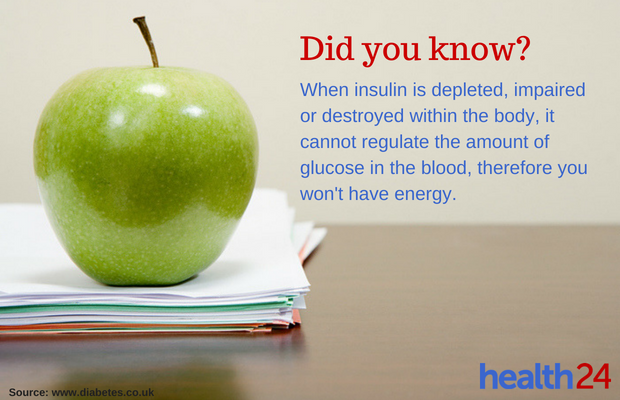
You've eaten your lunch, but 30 minutes later you are hungry again – you feel weak and shaky. You make your way down to the vending machine and try to get some energy from a chocolate bar, only to feel sluggish again soon afterwards.
Is this you?
You might be blissfully unaware of a condition that can increase your risk for type 2 diabetes.
What is the role of insulin?
Insulin resistance occurs when the body is unable to absorb and utilise the insulin it produces, resulting in elevated blood glucose levels.
According to the National Institute of Diabetes and Digestive and Kidney Diseases, insulin is a hormone that is made in the pancreas, an organ located behind the stomach.
The role of insulin is to allow cells of the body to absorb glucose to be used as fuel or stored as body fat. When your blood glucose level rises after a meal, insulin is released by the pancreas to help the liver, muscle and fat cells absorb the glucose.
Insulin also lowers your blood glucose levels by reducing glucose production in the liver. If you are healthy, your insulin automatically regulates your blood glucose levels.
What happens during insulin resistance?
Things go pear-shaped when the cells do not respond properly to insulin and can’t absorb glucose from your bloodstream. Your body needs higher levels of insulin to help glucose to be absorbed. As your pancreas tries to keep up with the demand for more insulin, it can start failing, leading to pre-diabetes and, ultimately, type 2 diabetes.
What are the symptoms?
Insulin resistance often shows no symptoms, or symptoms can take a while to appear.
There are, however, some signs that could suggest your insulin is not functioning optimally:
- Lethargy, especially after eating
- Regular sugar cravings
- Difficulty concentrating
- Weight gain around your stomach
- Low levels of "good" cholesterol
- Inability to lose weight, despite great efforts
Could you have insulin resistance? These are the criteria that increase your risk for insulin resistance, according to guidelines published by the American Heart Association:
1. A waist circumference measurement of more than 102cm in men, and more than 88cm in women.
2. A blood test revealing that you have a triglyceride (a type of blood fat associated with coronary heart disease) level higher than 1.7mmol/L, or if you are on drug treatment for elevated triglycerides.
3. A blood test revealing that you have low levels of “good cholesterol” – also known as HDL cholesterol. This is a level of less than 1.03mmol/L in men, and less than 1.3mmol/L in women or if you are on drug treatment for low HDL cholesterol.
4. If you have high or marginally raised blood pressure of 130mmHg systolic blood pressure and/or 85mmHg diastolic blood pressure, or if you are on medication to manage blood pressure
5. If you have raised blood sugar (glucose levels), with a blood test revealing elevated blood glucose of greater than 5.6mmol/L after an overnight fast.

When insulin resistance gets to the point of pre-diabetes, you might experience the following symptoms:
- Increased blood sugar levels
- Excessive thirst
- Increased urination
- Blurred vision
- Fatigue
Who is at risk for insulin resistance?
Insulin resistance is often linked to an unhealthy lifestyle. You may have an increased risk for insulin resistance and possibly pre-diabetes if you:
- Are overweight or obese
- Live a mostly sedentary lifestyle
- Have parents or siblings with diabetes
- Suffer from high blood pressure
What can you do about insulin resistance?
There are ways to reverse insulin resistance. These include making changes to your diet and exercise regime:
- Consult a dietitian who can guide you towards a low-carb diet.
- Eat a balanced diet of fruit, vegetables, whole-grains, fibre, lean protein and healthy fats.
- Ask your doctor to test you for pre-diabetes and regularly monitor your blood-glucose levels.
- Quit smoking.
- Manage and reduce stress levels.
- Regularly monitor your blood pressure and cholesterol levels.
Image credit: iStock




 Publications
Publications
 Partners
Partners











